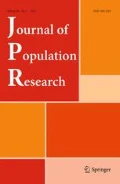Abstract
This paper investigates the effect of ethnic prejudice and perceived economic competition on support for deportation and alternative policy options concerning the handling of undocumented immigrants. Using a national survey conducted in early 2009, data are analysed using bivariate and multinomial regression techniques. Ethnic prejudice and perceived economic competition were found to be significantly related to support for deportation in the face of alternative options, controlling for the effects of age, sex, employment status, nativity, race, party identification, and education. Furthermore, majority support for deportation was found among conservatives, moderates, Republicans, and Independents. Even among liberals and Democrats, substantial numbers supported deportation. During the recent economic recession, perceived economic competition and ethnic prejudice were dominant influences on deportation preferences, and deportation appears to have become a mainstream policy option. However, we speculate that deportation preferences are relatively shallow and unstable owing partly to the dependence of immigration public opinion on economic cycles, and, ultimately, the unfeasibility of deportation as a policy option.


Notes
More recently, Reid (2010) has produced results similar to those of our survey findings, highlighting the growing support of the American public for the deportation of illegal Hispanic immigrants.
It must be noted that a large amount of empirical research has attempted to document actual trends associated with many of these survey items, and in some cases, the documented direction of these relationships presents a reality that may be related to negative opinions and attitudes about Hispanic immigrants in the US. However, following the standards of the PEW (2006, 2007) surveys on the climate surrounding Hispanics in the US, we ask our respondents only about their attitudes and opinions as they relate to these survey items.
Following these results, and helpful comments from reviewers, we should note that this unidimensional measure is probably the result of the high correlations among opinions and attitudes associated with ethnic prejudice and economic competition. Thus, the single extracted construct should be considered a measure of a single underlying sentiment associated with both high levels of ethnic prejudice and perceived economic competition as it relates to the current social climate of Hispanics in the US. It must also be noted that there remains a debate concerning the unique effects of cultural and economic factors. Initially, our analysis was designed to test for such competing relationships, but given the empirical results of this EFA, we are treating the two as a single construct driven by a single underlying sentiment.
References
Ayers, J. W., Hofstetter, R. C., Schnakenberg, K., & Kolody, B. (2009). Is immigration a racial issue? Anglo attitudes on immigration policies in a border county. Social Science Quarterly, 90(3), 593–610.
Branton, R., Dillingham, G., Dunaway, J., & Miller, B. (2007). Anglo voting on nativist ballot initiatives: The partisan impact of spatial proximity to the US-Mexico Border. Social Science Quarterly, 88(3), 882–897.
Branton, R., & Dunaway, J. (2008). English- and Spanish-language media coverage of immigration: A comparative analysis. Social Science Quarterly, 89(4), 1006–1022.
Burns, P., & Gimpel, J. G. (2000). Economic insecurity, prejudicial stereotypes, and public opinion on immigration policy. Political Science Quarterly, 115(2), 201–225.
Citrin, J., Green, D. P., Muste, C., & Wong, C. (1997). Public opinion toward immigration reform: The role of economic motivations. The Journal of Politics, 59(3), 858–881.
Espenshade, T. J. (1995). Unauthorized immigration to the United States. Annual Review of Sociology, 21, 195–216.
Espenshade, T. J., & Hempstead, K. (1996). Contemporary American attitudes toward US immigration. International Migration Review, 30(2), 535–570.
Esses, V. M., Dovidio, J. F., Jackson, L. M., & Armstrong, T. L. (2001). The immigration dilemma: The role of perceived group competition, ethnic prejudice, and national identity. Journal of Social Issues, 57(3), 389–412.
Hood, M. V., I. I. I., & Morris, I. L. (1998). Give us your tired, your poor… but make sure they have a green card: The effects of documented and undocumented migrant context on Anglo opinion toward immigration. Political Behavior, 20(1), 1–15.
Huber, G. A., & Espenshade, T. J. (1997). Neo-isolationism, balanced-budget conservatism and the fiscal impacts of immigrants. International Migration Review, 31(4), 1031–1054.
Kessler, A. (2001). Immigration, economic insecurity, and the ‘ambivalent’ American public. Working Paper 41. San Diego, CA: Center for Comparative Immigration Studies.
Lapinski, J. S., Peltola, P., Shaw, G., & Yang, A. (1997). The polls-trends: Immigrants and immigration. Public Opinion Quarterly, 61(2), 356–383.
Morris, J. S. (2007). Slanted objectivity? Perceived media bias, cable news exposure, and political attitudes. Social Science Quarterly, 88(3), 707–728.
Passel, J. S., & Cohn, D. (2009). A portrait of unauthorized immigrants in the United States. Washington, DC: Pew Hispanic Center.
Pew Hispanic Center. (2006). No consensus on immigration problem or proposed fixes: America’s immigration quandary. Washington, DC: Pew Research Center.
Pew Hispanic Center. (2007). Statistical portrait of Hispanics in the United States, 2007. Washington, DC: Pew Research Center.
Reid, A. (2010). Half of Americans would deport all illegal residents. Available at: http://www.angus-reid.com/polls/39296/half_of_americans_would_deport_all_illegal_residents/.
Scheve, K. F., & Slaughter, M. J. (2001). Labor market competition and individual preferences over immigration. The Review of Economics and Statistics, 83(1), 133–145.
Author information
Authors and Affiliations
Corresponding author
Rights and permissions
About this article
Cite this article
Cosby, A., Aanstoos, K., Matta, M. et al. Public support for Hispanic deportation in the United States: the effects of ethnic prejudice and perceptions of economic competition in a period of economic distress. J Pop Research 30, 87–96 (2013). https://doi.org/10.1007/s12546-012-9102-9
Published:
Issue Date:
DOI: https://doi.org/10.1007/s12546-012-9102-9

